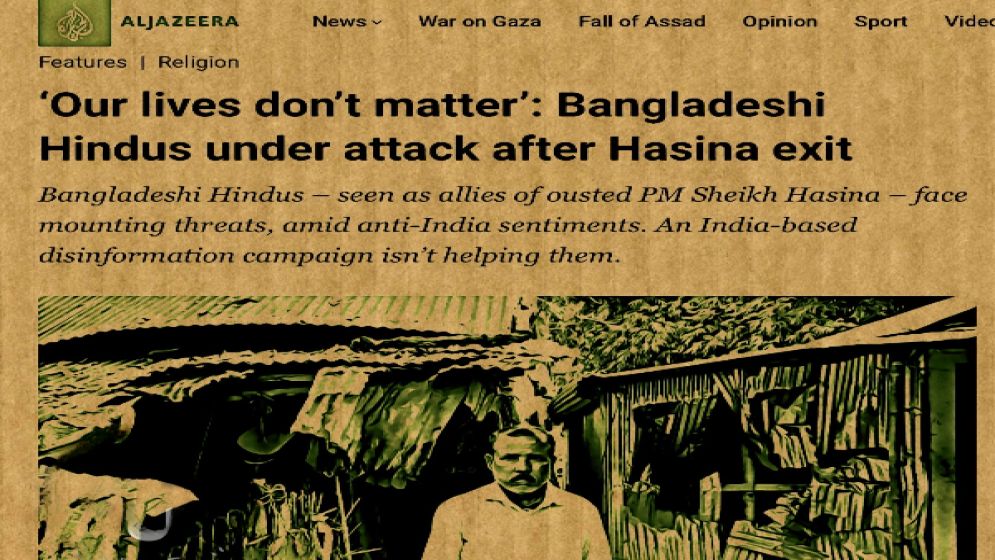Al Jazeera's report on “Hindu Oppression” in Bangladesh provokes controversy

Al Jazeera's recent article on Bangladesh, titled “‘Our lives don’t matter’: Bangladeshi Hindus under attack after Hasina exit,” has sparked controversy, with many criticizing the headline as "problematic" and potentially misleading about the situation of minorities in the country.
Published on December 12, the story has drawn significant backlash on Bangladeshi social media. Critics, particularly journalists, have labeled the article as “misleading” regarding the conditions of Hindus in Bangladesh.
Journalist Saqib Sarkar called it "a perfect example of how a report can tick all the right boxes of 'balance' while still presenting a misleading picture."
Tanveer Chowdhury, an Al Jazeera journalist, commented on Facebook that the article fails to provide a comprehensive view of the current situation, instead focusing excessively on a single incident, which he argued becomes the main theme of the piece.
Shafiqul Alam, Press Secretary to the Chief Advisor of the Interim Government, also criticized the report on his verified Facebook profile.
He took issue with the choice of Doarabazar as the focal point for alleged anti-Hindu hate crimes.
Alam questioned whether the Doarabazar incident was linked to political changes post-August 5 or if it was an isolated event triggered by an “alleged Facebook blasphemy post,” a scenario that has occurred many times since Facebook became widely used in Bangladesh in the late 2000s.
It should be noted that local police in Sunamganj have identified suspects involved in attacks on Hindu communities and filed a case against 150-170 individuals, arresting four, with 12 named in the charges.
Alam also pointed out that the Interim Government has never denied the occurrence of hate crimes. However, he emphasized that these incidents predominantly occurred between August 5 and 8, when there was no government and no police presence.
He clarified that most of these crimes were politically or personally motivated, rather than driven by religious hatred.
Alam also noted that the Al Jazeera article failed to acknowledge the significant efforts made by the Interim Government (IG), the country’s political parties, and religious organizations to promote calm following the brutal murder of lawyer Saiful Islam Alif by supporters of Chinmay Krishna Das.
“While some isolated violence occurred after the murder, overall, we passed a crucial test. Just imagine if a Hindu lawyer were killed by a Muslim mob in a Hindu-majority town in India,” Alam wrote on his Facebook page.
He further criticized the article for giving a sense of impunity regarding anti-Hindu violence.
"Just days before the story was published, the IG released data on the cases filed and the arrests made in connection with anti-minority violence. The Al Jazeera story should have included these figures,” he added.
Journalist Mehedi Hasan Marof, the reporter behind the controversial article, acknowledged on his Facebook that the headline of his piece "may appear amplified to some, and we recognize it might be misused by vested interests with malicious intentions."
"However, that does not negate the reality. At Al Jazeera, after multiple rounds of editing, fact-checking, and reviews, we believe our story accurately reflects what we observed on the ground and the current situation," Marof wrote.
Faisal Mahmud, a former Al Jazeera journalist recently appointed as the Minister (Press) at the Bangladesh High Commission in India, also weighed in, stating that the "on-the-ground reporting of the story is solid, and the overall piece is balanced."
However, he suggested that the article should have included "about 200 more words addressing the blatant misinformation spread by most Indian media, with the exception of a few outlets."
“This addition, along with a more precise headline, would have significantly improved the piece,” he concluded.
—

